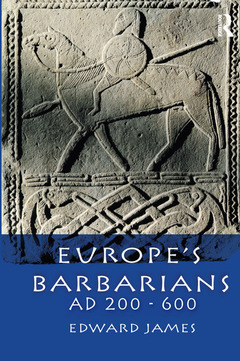Europe's Barbarians AD 200-600 The Medieval World Series
Auteur : James Edward

'Barbarians' is the name the Romans gave to those who lived beyond the frontiers of the Roman Empire - the peoples they considered 'uncivilised'. Most of the written sources concerning the barbarians come from the Romans too, and as such, need to be treated with caution. Only archaeology allows us to see beyond Roman prejudices - and yet these records are often as difficult to interpret as historical ones.
Expertly guiding the reader through such historiographical complexities, Edward James traces the history of the barbarians from the height of Roman power through to AD 600, by which time they had settled in most parts of imperial territory in Europe. His book is the first to look at all Europe's barbarians: the Picts and the Scots in the far north-west; the Franks, Goths and Slavic-speaking peoples; and relative newcomers such as the Huns and Alans from the Asiatic steppes.
How did whole barbarian peoples migrate across Europe? What were their relations with the Romans? And why did they convert to Christianity? Drawing on the latest scholarly research, this book rejects easy generalisations to provide a clear, nuanced and comprehensive account of the barbarians and the tumultuous period they lived through.
1. Who Are the Barbarians? 2. The Barbarians before AD 376 3. The Barbarians from 376 to 476 4. The Barbarians after 476 5. Ethnicity, Ethnogenesis and Identity 6. The Barbarians at Home 7. Barbarians in Roman 8. Barbarians on the Move 9. Assimilation, Acculturation and Accomodation 10. From Paganisms to Christianities 11. Kingdoms, 12. Conclusions
Date de parution : 11-2015
15.6x23.4 cm
Thème d’Europe's Barbarians AD 200-600 :
Mots-clés :
sidonius; apollinaris; peoples; magister; militum; world; societies; hunnic; empire; walter; Young Man; Pactus Legis Salicae; Row Grave Cemeteries; Long Sword; Free Italy; Vice Versa; Arian Missionary; Gamla Uppsala; Magister Militum; Walter Goffart; Hunnic Empire; Theodosian Code; Theodoric Strabo; Tribal Hidage; Rutilius Namatianus; Feddersen Wierde; West Heslerton; Barbarian Society; Sidonius Apollinaris; Gothic History; Furnished Burial; Przeworsk Culture; Arian Bishops; Depressing Point; Hiberno Saxon Art



